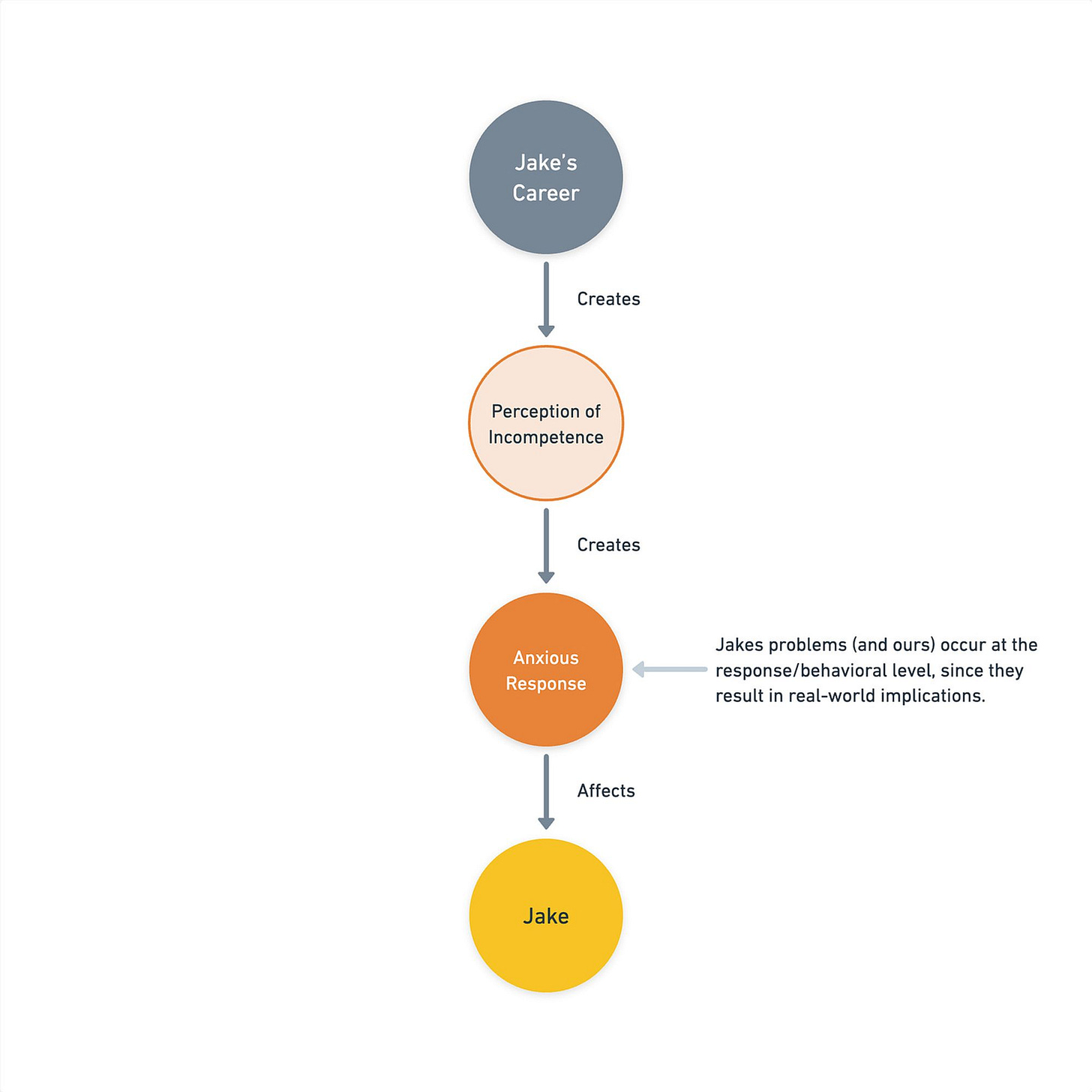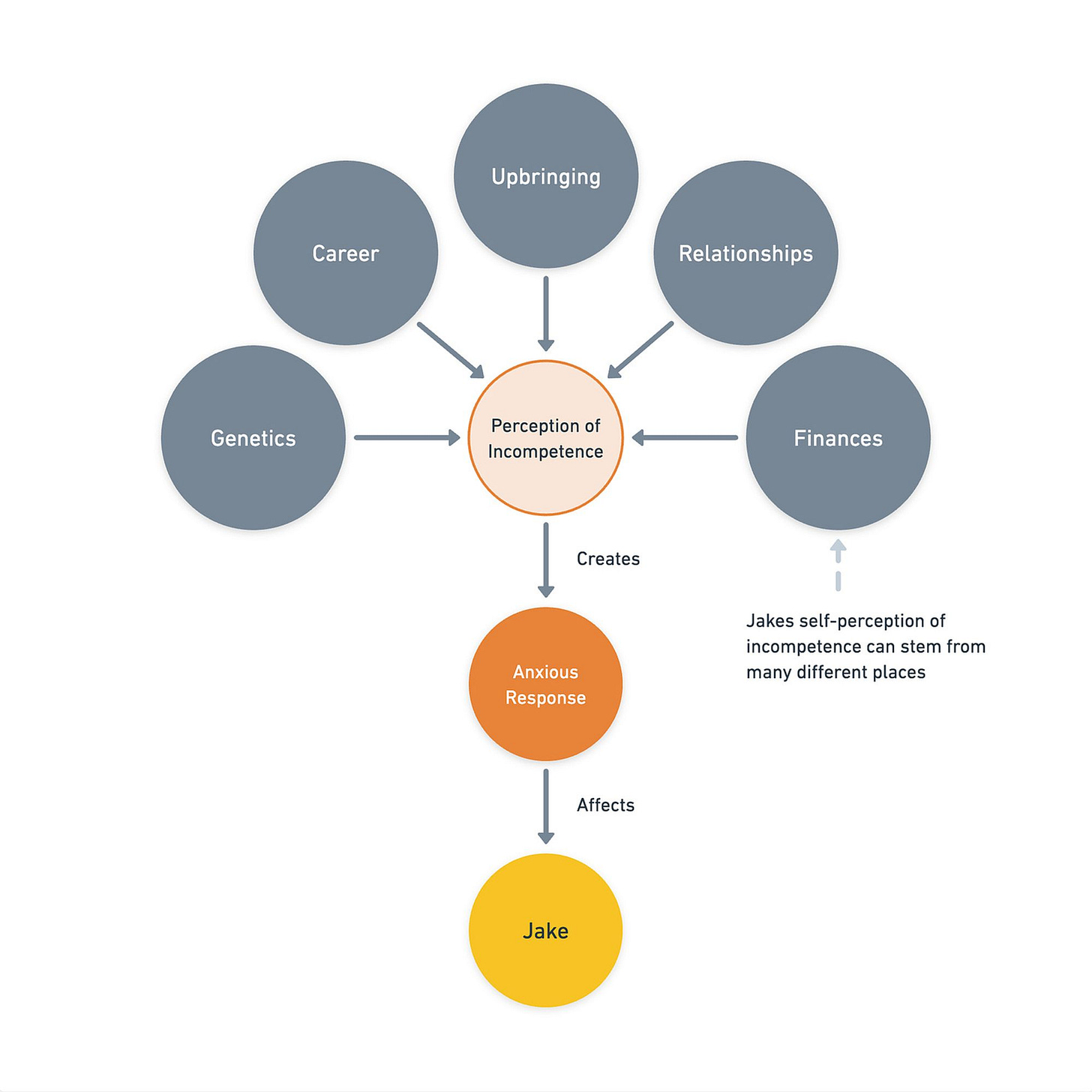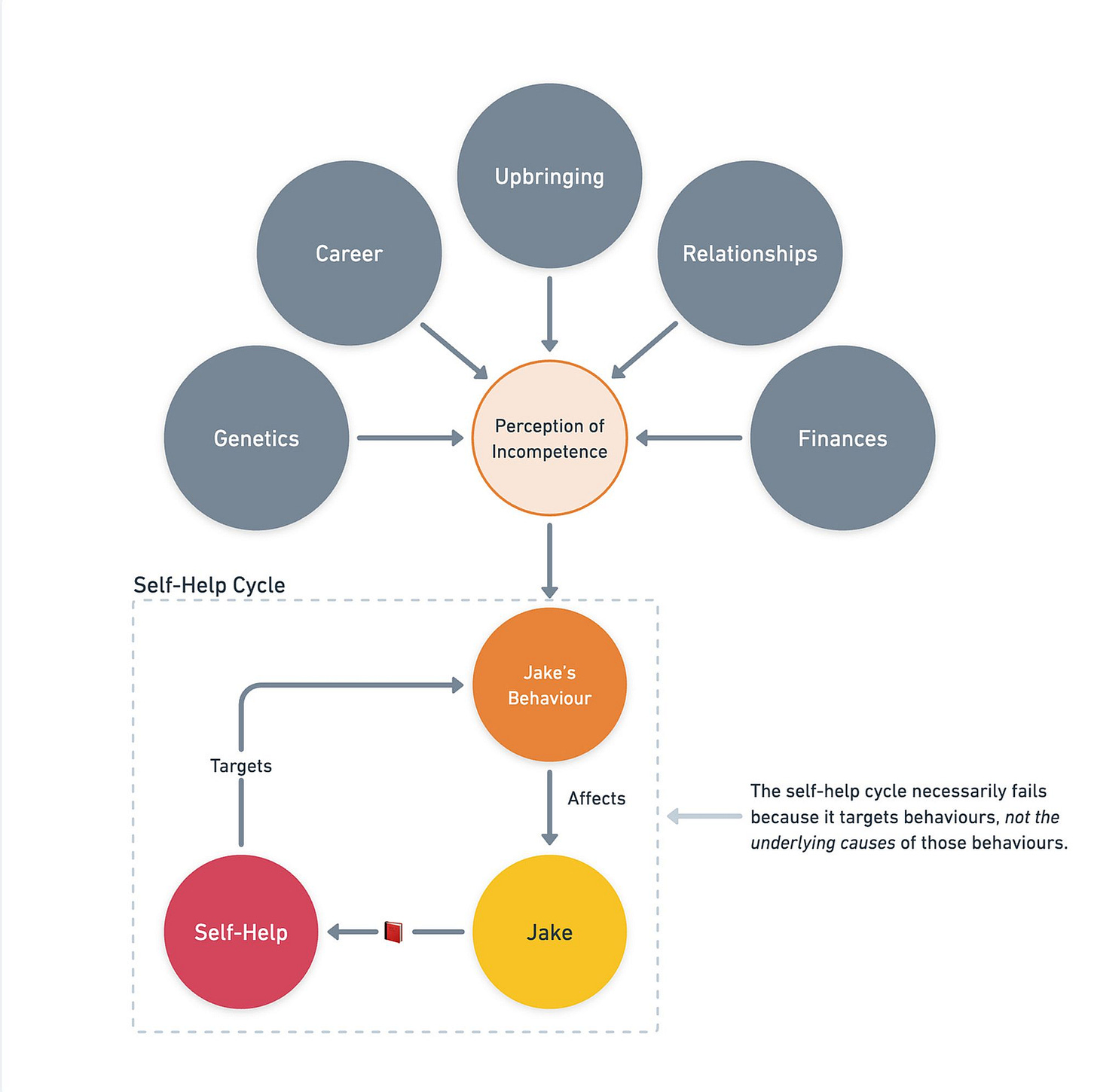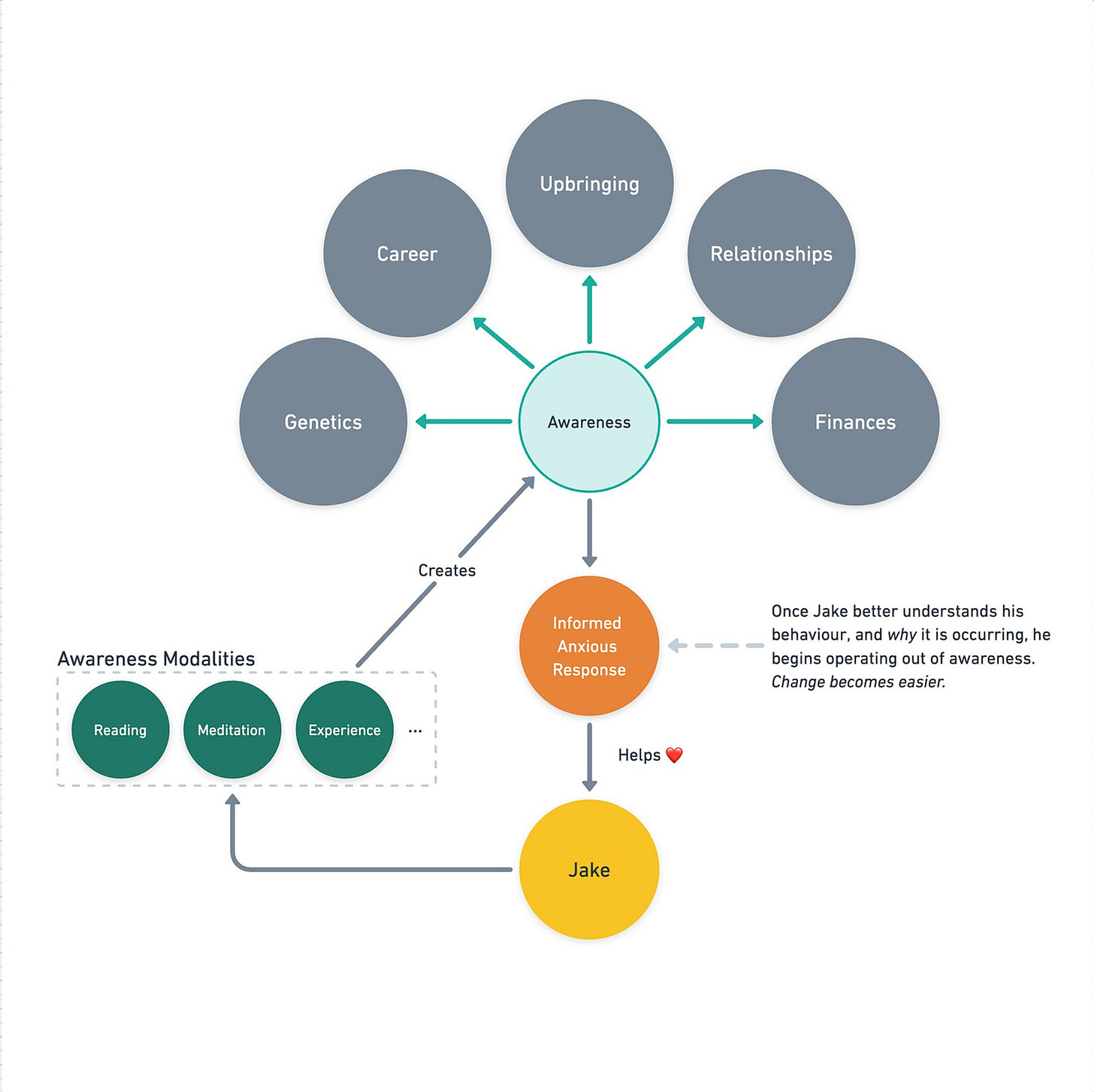God, Capitalism, and The Paradox of Self Help
Humans beings have an innate need to aspire to God.
Those that disagree with the above just have a God that manifests itself differently. Sometimes ones deity of choice is POTUS, the Universe, or the promise of Crypto. Sometimes it’s just God. Regardless, God represents a profound ideal embedded deep into our psyche, which without, will almost always lead to nihilism and despair. Karen Armstrong explains this in The History of God:
“There have been many theories about the origin of religion. Yet it seems that creating gods is something that human beings have always done. When one religious idea ceases to work for them, it is simply replaced.”
For thousands of years human beings have co-evolved with the idea of God. The symbolic story of Adam and Eve represents humans coming to consciousness after the creation of heaven and earth. Echoes of similar creation myths can be found across history and other religions such as Pandoras box, the Enuma Eilish, and many more.
Due to this fundamental religious instinct, Homo Sapiens were able to form large and complicated social structures due to the shared beliefs made possible by the mythology, ethos, and moral guidelines provided by religion. Whereas before the limit of our hunter-gatherer tribes was 150 people, religion acted as the cornerstone that made entire civilizations possible. This is explained in Sapiens:
“Sociological research has shown that the maximum 'natural' size of a group bonded by gossip is about 150 individuals. Most people can neither intimately know, nor gossip effectively about more than 150 human beings. [...] How did Homo sapiens manage to cross this critical threshold, eventually founding cities comprising tens of thousands of inhabitants and empires ruling hundreds of millions? The secret was probably the appearance of fiction. Large numbers of strangers can cooperate successfully by believing in common myths.”
Common myth, as Harari explains, is what keeps our societies glued together beyond 150 humans. Although this is still true today, the common myths of today no longer include God as it once did.
For example, I was raised in Canada. Although Canada has some socialist leaning policies, it is largely capitalistic, embraces diversity/multiculturalism, and emphasizes equity and fairness. Coincidentally, I tend to embody these values in my work and free time. I aim to start my own business, enjoy meeting people from different countries, and see myself as an egalitarian. So long as my neighbour and I believe in a shared idea of Canada, our society will continue to function. This however, is a common myth absent of God.
After the enlightenment, the West supplanted God with science and philosophy with the realization that “large and consistent moral theories could exist without reference to God"1. Thereafter, humanity and many in the west began to look for meaning in other systems; this lead to the creation of communism, nazism, nationalism, and other governing ideologies as man searched for meaning in a world without a divine ruler. Fast-forward to 2024, the west finds itself in a world without religion, grappling with the existential task of defining our own values.

The Beginning of Self-Help
In the west, we have largely replaced Christian values with capitalist values. This is not at all a bad thing — capitalism has brought us tremendous benefits and has lowered baseline poverty all around the world2. However, no system is perfect. Capitalism’s laissez faire approach to the economy also obscures a more insidious agenda, which seeks to exploit and capitalize on our innate human need for improvement — something religion once provided. In the early days, “gurus” began teaching others how to become rich in deceptive get-rich-quick schemes. Pickup artists made their claim to fame by teaching depressed men how to emotionally manipulate women (Jordan Peterson classified this behaviour as psychopathic3). Gary Vaynerchuk popularized hustle culture4, even advocating that people work 18 hour days (no, thanks). The list goes on: biohacking, digital minimalism, “Law of attraction” coaches and more. The once deification of our priests, prophets, and Gods alike gave way to the new era of influencers, aiming to help (and oftentimes exploit) a vast many people under the pre-tense of self-help.
Although there are thousands of ways to help yourself and resolve your problems, most branches of internet self-help fail for one fundamental reason:
"Internet self-help often focuses on changing behaviours, as opposed to providing insight into why we do the things we do."
As I will explain later, changing your behaviours is effortless once you have awareness of a problem and why it is occurring. This is why meditation and therapy is helpful; once someone understands why they’re behaving a certain way, making changes in their lives is easier because they have achieved clarity — the path forward becomes obvious.
Self help on the internet instead focuses on behaviour management. This treats the symptoms of our problems, not their root causes. This comes from a good place however; most of our problems are a result of our behaviours. If I’m up until 2AM at night consistently, and wake up with brain-fog every morning, I should go to bed earlier to solve the problem. Right?
Although this approach to problem solving makes sense at a surface level, it fails because it doesn’t address the root causes of the issue. Why am I up until 2AM? What am I doing this late? Is there something causing me to behave this way? Any advice we receive online will never answer these questions — this investigation must be done ourselves.
A quick #advice search on TikTok verifies this claim:
Much of the above advice is about “fixing your mindset” and other permutations of behaviour management. Those who go down this rabbit hole may find themselves in a worse place than where they left off. This is the paradox of self-help:
Self-help isn’t self-help. It involves unidirectional advice that fails to take into account your current life circumstances.
Socrates himself was against writing. In his mind, written words “preserve a solemn silence”5 when asked a question, and therefore fail to convey true Knowledge. Internet advice is much the same — it lacks dialogue, and is therefore passive in nature. In stark contrast, apps and digital tools are utilitarian by nature. Search engines index millions of results in less then a second to get you where you need to go. Your next Über is a few taps away. There are entire engineering teams working to speed application response times by as little as 50 milliseconds. These applications are there to help you get things done. Ellen Lupton explains this in her book, Thinking With Type:
“The impatience of the digital reader arises from culture, not from the essential character of display technologies. Users of websites have different expectations than users of print. They expect to to feel “productive”, not contemplative. They expect to be in search mode, not processing mode.”
We usually browse the internet to accomplish something. The utilitarian nature of applications and digital tooling means they serve a clear purpose; This is how businesses make their money. However, since the internet has a culture of productivity, the long and hard path is swept under the rug in favour of more practical, “tangible” solutions. As such, the internet offers what the people want — shallow advice, productivity based time management tools, AI therapy, and a plethora of online courses ready to solve this or that problem. It is my belief that most of these modalities will fail to help you in any meaningful way.
When engaging with this part of the internet, ask yourself:
How many of these apps and self-help “gurus” would still try to help you if it didn’t make them any money?
Again, this is not necessarily a jab at capitalism. As a consumer however, it is important to know that these tools serve an agenda; and they may not always be in your best interests. To truly help yourself, you’ll have to take a different approach.
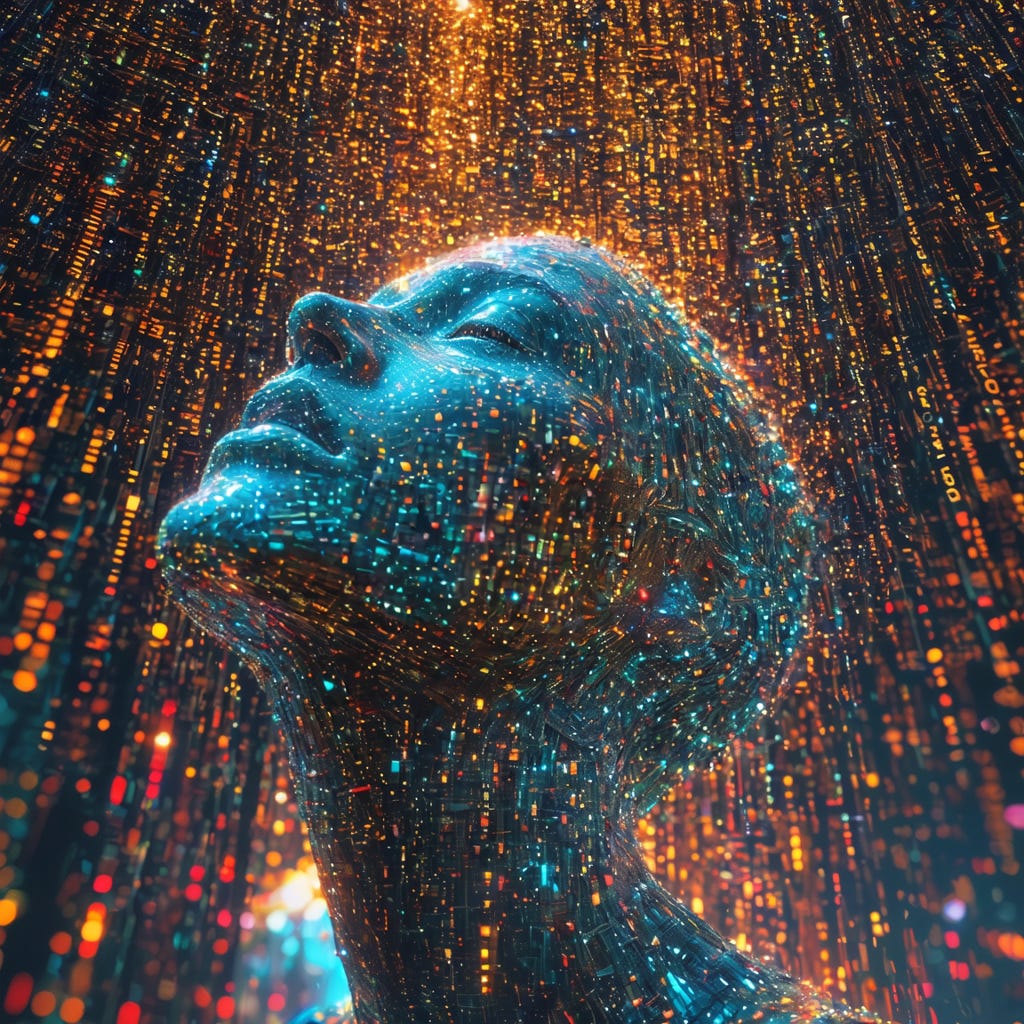
How To Actually Help Yourself
As I explained earlier, helping yourself becomes much easier once you have awareness of a problem and why it is occurring. In awareness we have clarity, and with clarity the path forward becomes obvious. This best illustrated with an example.
We will call our protagonist Jake. Jake is working a well paying job in Toronto and making progress in his career. He has a girlfriend, a group of friends he enjoys hanging out with, and has a few side projects of his own. Sound familiar?
Unfortunately for Jake, he finds himself very anxious when he comes in to work every day. Some days he feels like an imposter, other days he feels that he is going to make a mistake and get fired. Despite his manager’s reassurances, deep down Jake feels he is incompetent at his job.
After looking at career advice on TikTok, Jake is left more confused. Some people recommend he work less, not more. Others recommend the opposite. Some tell him to be confident. Others tell him to be more assertive. Where to begin?
We can summarize Jakes career anxiety into the following diagram:
Most of our issues follow this pattern. Based on how we perceive the inside/outside world (consciously or subconsciously), we respond instinctively. If I see my career prospects as bad, I will respond anxiously. If I see my career prospects as good, I will respond positively (more on this in my article here). From this we can deduce the following:
Our problems stem from our perceptions of the internal and external world.
As we begin to alter our perceptions, our minds and bodies will respond naturally. According to a study by Boston University, optimists are more likely to achieve “exceptional longevity” and are found to live 11 to 15 percent longer6. This is obvious — optimists have a positive perception of the world, and what follows is a healthy physiological response from the body.
However, just because Jake comes in anxious to work every day does not mean that his career anxiety necessarily stems from his career. It is entirely possible that Jake’s anxiety may stem from something else, manifesting as career anxiety; this could be his upbringing, his relationship with his girlfriend, his finances, etc. Since Jake does not know the source of his anxiety, we can update the diagram to more accurately reflect what is occurring within Jake:
This diagram helps us illustrate an important question:
Where is the source of Jake's problem?
Now, if Jake were to begin to try and help himself, he may begin scrolling TikTok, Instagram, or even begin reading self-help books. This self-help process necessarily fails because it targets behaviours, not the underlying causes of Jakes anxiety. I call this the self-help loop, because it is cyclical and does not arrive anywhere meaningful.
Because self-help targets behaviours, we fail to learn about the causes of Jakes anxiety. Feelings of anxiety can come from poor sleep, gut problems, childhood traumas, excessive weed, lack of sunlight, and more. Understandably, this list could go on forever. Where to begin?
The way to break out of this cycle is by achieving awareness. There are various different modalities to achieve this, my favourite being meditation. Some people reach clarity by reading many books. Others by experiencing as much possible. Others by having great conversations with close friends. The point being, that every time you learn something new about the world, your awareness grows. As your awareness grows, you can begin to “hone-in” on the problem, and discover its root cause. This is true self-help.
A Personal Story
The beauty of awareness is that once it is achieved, it is difficult to forget.
I used to have an undiagnosed health problem.
My issues started in Germany, when I woke up one day with tremors, blurry vision, and brain fog. I remember this clearly because I checked myself in to the hospital on the day of my 19th birthday. After visits with many different doctors, they concluded that I most likely had multiple sclerosis. Without tests however, they wouldn’t be able to confirm. For the first time in my life, everything came crashing down on me.
After some time, I started to get depressed. What was my problem? Why was this happening to me? Was I going to live the rest of my life this way?
What did I do to deserve this?
After the worst year of my life, I decided I had to put my life back together on my own. This was a hard lesson to learn — nobody could help me but me. I began reading The Holy Bible, and more spiritual texts like Michael Singer, Joe Dispenza, and Paramahansa Yogananda. They all emphasized the importance of God.
From there I began reading health literature, and learnt about spontaneous cancer remissions, miraculous recoveries, the importance of sleep, and many other health science books that helped me understand the human body. I began eating healthy, went vegan, exercised, and even worked at a local farmers market. I began to take life seriously.
Around this time I began to meditate, and started noticing things about myself that I never noticed before. Why is this making me angry? Why is this making me sad? What is the source of my stress?
I began observing reactions. I noticed thought patterns. I noticed limiting beliefs. For the first time, I started paying attention to what was happening inside. The more and more I did this (over many months and years), I began to get lighter. The progress was slow at first, but after a long time I noticed a dramatic shift. I was alert. I was more energetic. I could tell if someone was low energy, or high energy. As my attention drifted inwards, it began to radiate outwards into other areas in my life. Little by little, I was beginning to see…
After ~5 years of spiritual work, I am glad to say I am finally healthy once again. Visits to my GP and naturopath all indicate normal levels, and I no longer tremor like I used to.
Although I still do not understand what caused my body to react the way it did, I overcame an unknown problem by learning about the world and applying my knowledge. As my awareness grew, the clearer everything would become. I began relaxing in the face of existential fear, and overtime learn to overcome it. As I did, my body began to relax, and I could begin the process of recovery.
This was awareness in action.
Thank you for reading! If you are on web, I highly recommend reading the interactive version here. There are pieces of information hidden throughout that I was not able to add on Substack.
thank you for everything,
Marcelo
"God is dead" - Friedrich Nietzsche
https://bigthink.com/thinking/what-nietzsche-really-meant-by-god-is-dead/
The Capitalist Manifesto: Why the Global Free Market Will Save the World
https://en.wikipedia.org/wiki/The_Capitalist_Manifesto:_Why_the_Global_Free_Market_Will_Save_the_World
Jordan Peterson explains why pickup artistry is psychopathic
Socrates lacked belief in writing as a medium of philosophical discourse.
https://wondermark.com/socrates-vs-writing/



